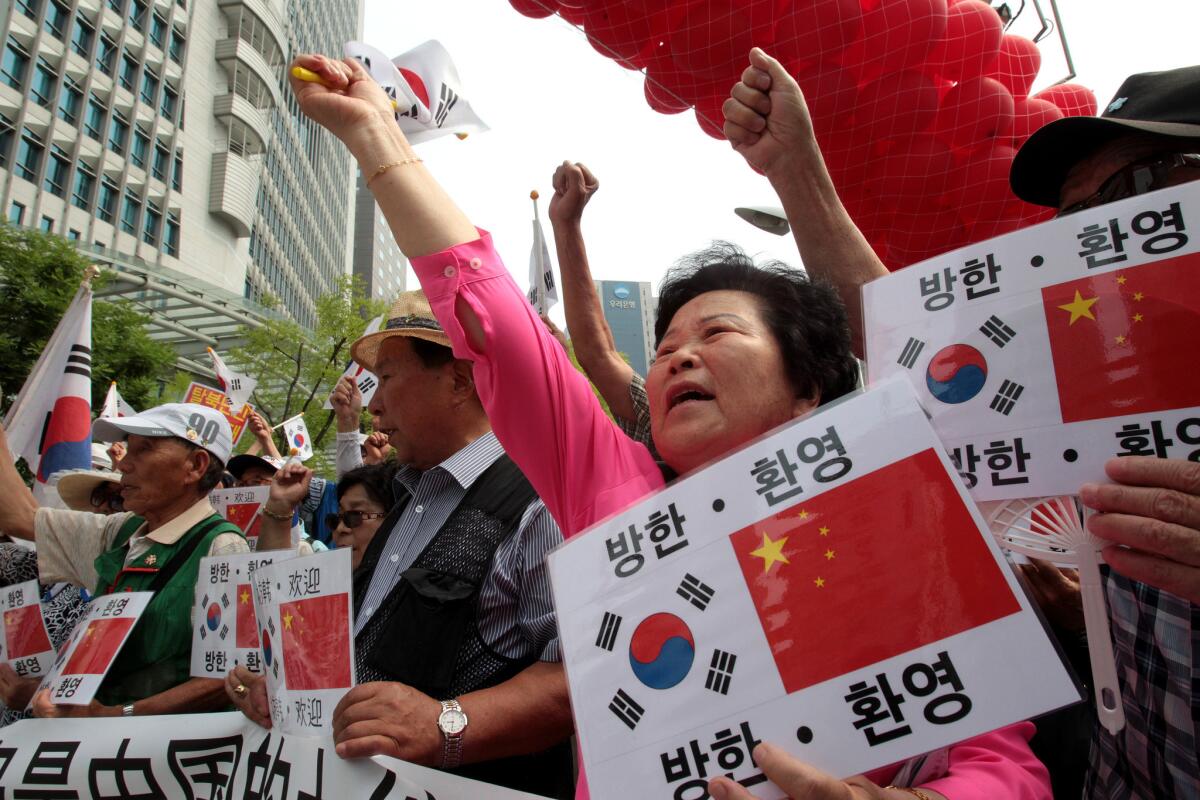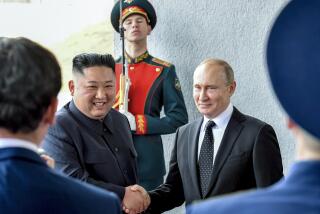China’s Xi to visit South Korea, suggesting impatience with North

Reporting from Seoul ‚ÄĒ Chinese President Xi Jinping will make his first visit to Korea on Thursday, and in a break with tradition, he will visit South Korea instead of China‚Äôs old ally in the North.
Chinese presidents have visited Pyongyang before Seoul since South Korea and China established diplomatic relations in 1992, and Xi’s decision could be a sign of growing impatience with North Korea’s nuclear and missile antics. Indeed, no high-level meetings have taken place between China and North Korea with their current leaders in power.
But while China and North Korea drift apart, Beijing’s relationship with Seoul is blossoming, and Xi could be making a gesture to demonstrate the growing importance of those ties. Xi will spend two days in South Korea; the agenda will include talks about how to further expand already booming bilateral trade and the sensitive issue of North Korea’s nuclear program.
This will be Xi’s second summit with South Korean President Park Geun-hye, after she made an official visit to Beijing last June.
Chinese state television reported on Wednesday that Xi and his South Korean counterpart will work on signing as many as 12 agreements and plan to issue a joint statement. The two countries are also in the process of negotiating a free trade agreement, which could be completed as early as the end of this year.
Trade between China and South Korea reached $270 billion in 2013, according to Chinese government data, and the free trade agreement would provide a framework to keep building commercial ties.
‚ÄúChina has incentive to upgrade its relationship with South Korea in terms of trade, investment and culture,‚ÄĚ said Paik Hak-soon, director of the Center for North Korean Studies at the Sejong Institute in South Korea.
Despite the growing partnership, the specter of a dangerous and isolated North Korea will hang over the summit.
Possibly to draw attention to itself ahead of Xi’s visit, North Korea on Wednesday carried out test launches of short-range ballistic missiles for the third time in less than a week. Such launches violate U.N. Security Council resolutions that ban North Korea from any nuclear or ballistic missile activity.
With Xi in Seoul, South Korea’s Park is expected to seek a firm statement that China will make more effort to pressure Pyongyang to give up its nuclear program.
China is seen as the only country with any influence in getting North Korea to give up its ambition of becoming a fully recognized nuclear power. But because of the two countries’ historic alliance, China has often opted not to cooperate with international efforts to sanction the North.
‚ÄúDenuclearization of the Korean Peninsula has been an issue among the neighboring countries and international community for a long time. During President Xi‚Äôs visit there, the two leaders will exchange views on the issue, in particular, the early resumption of the six-party talks,‚ÄĚ Chinese Vice Foreign Minister Liu Zhenmin said, according to Chinese state-run television.
On Monday, perhaps in anticipation of this week‚Äôs discussion of its nuclear program, North Korea‚Äôs official Rodong Sinmun newspaper described denuclearization as ‚Äúa wild dream that can never be achieved.‚ÄĚ
North Korea argues that its nuclear program is necessary to defend against threats posed by the United States and South Korea.
Following Park and Xi‚Äôs summit in China last year, the two leaders issued a statement that included only a general mention of ‚Äúdenuclearization of the Korean peninsula,‚ÄĚ instead of a pointed remark on North Korea ceding its nuclear ambitions.
This time, analysts say, Park is likely to make a stronger effort at getting China to express commitment to the goal of North Korean denuclearization.
‚ÄúIn the statement from last year‚Äôs summit, Xi was unwilling to pinpoint North Korea, choosing instead to include them only by implication. This time Park will at least push to get a clear statement from Xi on North Korean denuclearization down in ink,‚ÄĚ said Sung-yoon Lee, an assistant professor at the Fletcher School of international affairs at Tufts University.
China remains North Korea’s only major ally and benefactor, but the Pyongyang regime is believed to resent its dependence on its much larger, more powerful neighbor. In a vivid illustration of North Korea’s growing international isolation, since taking power in late 2011, North Korean leader Kim Jong-un has not met with any world leader.
Borowiec is a special correspondent.
More to Read
Sign up for Essential California
The most important California stories and recommendations in your inbox every morning.
You may occasionally receive promotional content from the Los Angeles Times.










